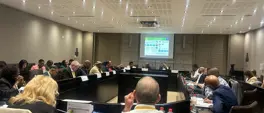ADAM CHARNAS | Response to Malaika Mahlatsi: We do not use the term antisemitic lightly
Adam Charnas
25 November 2024 | 11:34It is disingenuous and offensive to compare isolated incidents of football hooliganism to a deliberate, city-wide campaign of antisemitic violence, writes Adam Charnas.
On November 15, this platform published an unfortunate, ill-informed, and derogatory piece titled “The Weaponisation of Anti-Semitism Endangers Us All.”
The insinuation that the term antisemitism is being ‘weaponised’ to stifle legitimate criticism of Israel is deeply offensive. It is particularly insulting (and antisemitic) to insinuate that Jews cannot be trusted when speaking about prejudice against themselves and that it is therefore in order to define it on their behalf.
We do not use the term antisemitic lightly and will decide for ourselves what we deem to be offensive.
Mahlatsi goes to great lengths to state that Jews are casually weaponising antisemitism, or as she writes it “anti-semitism,” putting their own communities in danger by “exacerbating the false equivalency between Jews and Zionists.”
Even the use of quotation marks in her writing of “anti-semitism” is blatantly insulting and plainly hateful. It indicates that the Jews who experienced this hatred cannot be trusted. In a great irony the term “anti-semitism” is itself antisemitic.
She then diminishes violent incidents against Jews in Amsterdam, dismissing attacks on Maccabi Tel Aviv soccer fans as provoked by their behaviour. She suggests that fans instigated the violence by pulling down flags and singing inappropriate songs, accusing them of “playing the victim.”
This argument employs a dangerous false equivalence, reframing the victims as perpetrators and implying that they deserved the attacks.
The attacks against Jewish soccer fans were explicit, antisemitic, and premeditated. Maccabi fans were targeted because of their links to Israel and because they were Jews. Media reports further entrench this fact, indicating that the social media groups on which the violence was organised called for a “Jew Hunt.”
Let it be clear, it is disingenuous and offensive to compare isolated incidents of football hooliganism to a deliberate, city-wide campaign of antisemitic violence.
Mahlatsi also misrepresents Israel as a genocidal state and distorts findings from the International Court of Justice (ICJ).
Contrary to her claims, the ICJ has not ruled that there is prima facie evidence of genocide in Palestine. Instead, it emphasised the need to uphold protections against genocide, which does not imply that genocide is occurring. Her misrepresentation is inflammatory, demonising, and an irresponsible distortion of international legal findings.
Mahlatsi then goes on to decry the actions taken by the government of Germany, which has taken a brave stand against the antisemitism disguised as anti-Zionism. Here, again, Mahlatsi seems unable or unwilling to accept that anti-Israel discourse can, and often does, cross the line into antisemitism.
Certainly, no other nation is as critical of its government as Israel itself.
Mahlatsi states that there is a false equivalency between Judaism and Zionism. It is misleading and, in fact intellectually dishonest to portray the State of Israel on the one hand and world Jewry on the other, as if they are entirely separate and distinct entities, so that prejudicial treatment towards the one is unrelated to nor has any negative impact on the other.
Israel is the nation state of the Jewish people, and it has always been recognised as such by the international community.
The Jewish people have an association with the territory of Israel that stretches back, unbroken, for more than three millennia. The Land of Israel is of absolutely central importance in Judaism and connection to this territory has been an all-pervasive theme in the laws and liturgy of Judaism.
Thus, those who act as if Jews somehow appeared from out of nowhere to unlawfully seize land that never belonged to them in the first place are in fact guilty of denying Jews their own culture and religious heritage, as well as of trying to write them out of history.
In view of all this, it is inevitable and in fact quite understandable why the great majority of Jews wherever they might be do at some level support and identify with the State of Israel and are concerned about its safety and wellbeing.
This does not in any way suggest that Israel is therefore immune to criticism, nor indeed have its advocates ever claimed such a thing. What it does mean, however, is that when Israel is subjected to unfair and discriminatory treatment – and how much more so when its citizens abroad are subject to coordinated violent attacks, as was the case in Amsterdam - it inevitably impacts negatively on Jews everywhere and has at some level to be regarded as an attack on Jewish peoplehood.
If Mahlatsi had devoted a little effort to finding out what the credible Jewish leaders around the world actually have to say on the subject, she would have learned that literally no one is claiming that any criticism of Israel automatically amounts to antisemitism.
The question of antisemitism only arises when Israel is in reality subjected to discriminatory, demonising treatment, or when Israel (or Zionism) is used as an “acceptable” code word for Jews, whitewashing what would otherwise be base antisemitism.
Mahlatsi refuses to even acknowledge let alone engage with any of this. Instead, she chooses to engage in the straw-man tactic of caricaturing what Jews are allegedly saying and then proceeding to demolish their supposed arguments.
Typical of those who clearly nurse a deep hatred towards Israel she prefers to talk about Jews rather than to them.
Adam Charnas is an analyst for the SA Jewish Board of Deputies.
Get the whole picture 💡
Take a look at the topic timeline for all related articles.
Trending News
More in Opinion

17 October 2025 12:54
MALAIKA MAHLATSI | Ntshavheni’s alarming constitutional delinquency, inhumanity and impunity

17 October 2025 12:42
CHRIS OXTOBY & JUDITH FEBRUARY | JSC interviews – Showing a challenging road ahead?

15 October 2025 14:59
CHARLES MATSEKE | South Africa’s quiet privatisation and the birth of an Oligopoly













